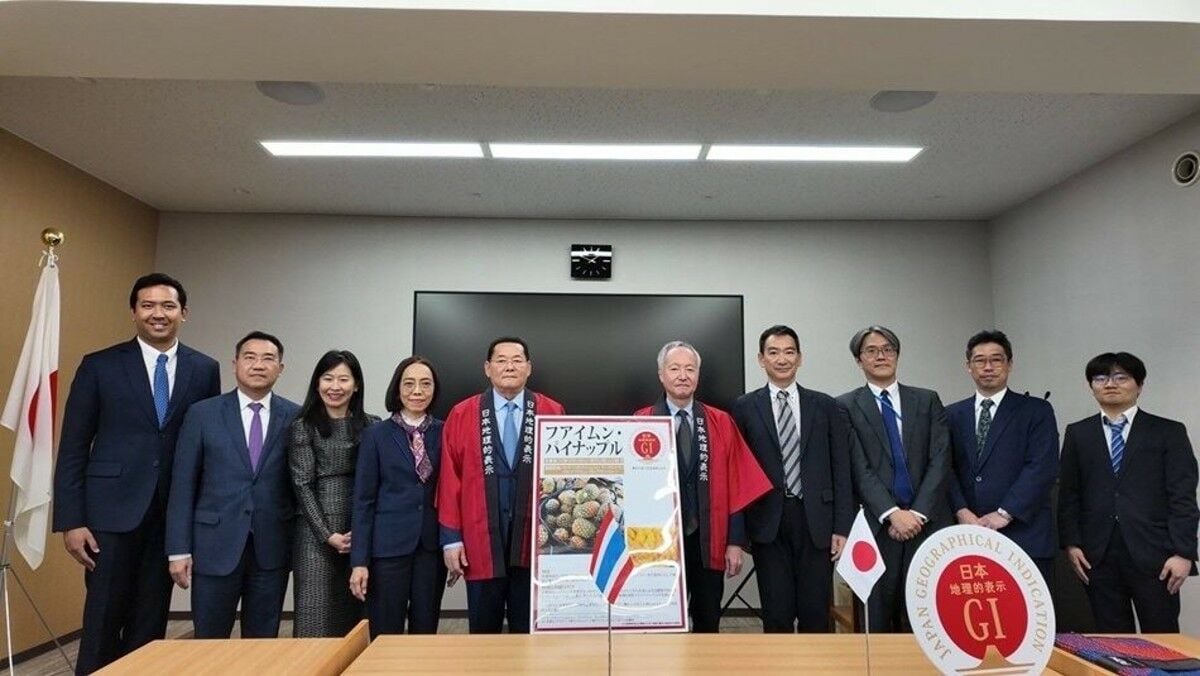Thailand’s Huai Mun Pineapple gains GI status in Japan

Thailand’s Deputy Minister of Commerce, Naphinthorn Srisampan, recently engaged in discussions with Japan’s Deputy Minister of Agriculture, Forestry, and Fisheries, Yoichi Watanabe.
They focused on the registration of Huai Mun Pineapple as a Geographical Indication (GI) product, marking the first Thai fruit to achieve this recognition in Japan. The meeting also included a visit to Japan’s largest wholesale market for fruits, vegetables, flowers, and seafood.
Naphinthorn expressed his delight at Japan’s decision to register the Huai Mun Pineapple as a GI product. This registration follows Thailand’s Doi Chaang and Doi Tung coffee under the 3+3 GI registration collaboration. The GI status serves as a testament to the quality of the product.
The Huai Mun Pineapple, known for its Patavia variety, stands out with its thick, soft honey-coloured flesh, sweet fragrance, and high nutritional value. These attributes make it popular among Japanese consumers, highlighting its export potential. Thailand boasts over 850 producers with an annual production capacity exceeding 180,000 tonnes, translating to a market value of over 1.2 billion baht, said Naphinthorn.
“It is gratifying to see Huai Mun Pineapple being recognised in Japan, further strengthening our trade relations.”
The deputy minister tasked the Department of Intellectual Property with advancing to the second phase of collaboration to expand the market for Thai GI products in Japan. Furthermore, discussions with Japan are underway to jointly develop a system for protecting geographical indications.
Japan market
The Japanese pineapple market continues to show promising growth, with local consumers preferring fresh pineapples known for their sweet and juicy taste. The annual domestic consumption in Japan exceeds 180,000 tonnes, including processed pineapple products like juice, canned, and dried pineapple.
Due to Japan’s climate being unsuitable for pineapple cultivation, the country relies heavily on imports, with Thailand ranking as the fourth-largest supplier following the Philippines, Costa Rica, and Indonesia, said Naphinthorn.
“The economic partnership agreement between Thailand and Japan (JTEPA) provides a platform to negotiate additional trade benefits for agricultural products, including pineapples from Thailand.”
During the visit, Naphinthorn toured the OTA Wholesale Market, Japan’s largest wholesale market for fruits, vegetables, flowers, and seafood. With a daily trade turnover exceeding 500 million baht, the market offers valuable insights into space management, agricultural product auction processes, and wholesale trade and logistics.
This knowledge is deemed essential for developing fair agricultural marketplaces in Thailand, especially benefiting small-scale farmers and retailers, said Naphinthorn.
“Observing the operations at OTA Wholesale Market allows us to improve our agricultural marketing strategies and further expand the reach of Thai produce in Japan.”
The visit also served as an opportunity to explore channels for increasing exports of Thai fruits and vegetables to Japan. The bilateral discussions and market observations underscore the potential for enhanced agricultural trade between the two nations, fostering economic growth and mutual benefits.
The recognition of Huai Mun Pineapple as a GI product in Japan not only exemplifies the quality of Thai produce but also opens new pathways for Thai agricultural products in international markets, reported KhaoSod.
What Other Media Are Saying
- Vietnam Plus reports Thailand’s Department of Intellectual Property plans to register more GI products in China and Malaysia to enhance market value and combat piracy, responding to rising demand. (read more)
- FAS USDA reports Japan’s MAFF granting geographical indication protection for Thailand’s Pineapple Huaymun, marking a significant step in recognising foreign GI items and enhancing agricultural trade relations. (read more)
Frequently Asked Questions
Here are some common questions asked about this news.
Why is the Geographical Indication (GI) status crucial for Thai products like the Huai Mun Pineapple?
GI status authenticates quality, boosts exports, and strengthens international trade relations, enhancing Thailand’s agricultural reputation.
How might the recognition of Huai Mun Pineapple as a GI product impact Thailand’s agricultural market?
It could increase global demand, improve market positioning, and encourage sustainable farming practices among Thai producers.
What if Thailand expands its GI product list in Japan? How could this affect the bilateral trade dynamic?
Expanding the GI product list could deepen trade ties, diversify export portfolios, and enhance economic cooperation between Thailand and Japan.
How does Japan’s import reliance influence Thailand’s pineapple export strategy?
Japan’s dependency on imports presents a lucrative opportunity for Thailand to increase market share and enhance trade benefits.
What lessons can Thailand learn from Japan’s OTA Wholesale Market to improve its agricultural systems?
Thailand can adopt efficient trade logistics, auction processes, and space management strategies to bolster its local agricultural marketplaces.
Latest Thailand News
Follow The Thaiger on Google News:


























